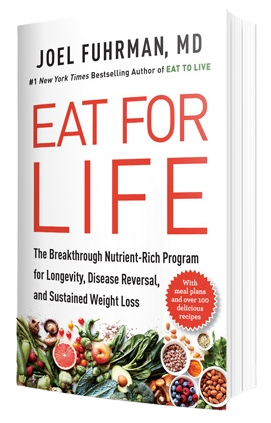I have been passionate about studying nutrition and applying nutritional excellence to help patients reverse disease for more than 30 years. I coined the term Nutritarian to describe the research-backed dietary portfolio containing the most powerfully protective and longevity-promoting foods.
Incredibly, on top of these powerful benefits, a diet this healthful naturally lessens the desire to overeat, making it ideal for those who need to lose weight.
For many reasons, excess body fat can impact the normal function of multiple body systems, accelerating the aging process and increasing the likelihood of disease. Fortunately, it turns out that the same dietary profile that promotes a healthy, stable weight maximizes protection against disease, such as cancer, and infection and provides the best quality of life.
It may sound too good to be true, but in this case, it actually is true, and I have decades of patient case stories and have published many research articles to prove it.
Conventional weight-loss diets almost always fail because they lack sufficient nutrients to fuel proper metabolism and control our body’s caloric drive. Science continues to show that “yo-yo” dieting and weight cycling are not health-promoting, and sustaining a healthy body composition over the long-term is vital to extending lifespan.
Furthermore, while consuming fewer calories will generally lead to weight loss, the lack of essential micronutrients in both the Standard American Diet and many popular diet programs disrupt normal rhythms of appetite and satiety, contributing to food addiction and endless rounds of gaining and losing weight. Just reducing portion sizes and eating less of a poorly designed diet is impossible to maintain for long. Keeping the weight off and achieving good health requires making healthful dietary changes based on proven nutritional research and sticking with them for the rest of your life.
Nutritional excellence
To be your healthiest, you have to eat the healthiest diet! There are a lot of definitions for a “healthy” diet, but decades of research have confirmed that a way of eating utilizing mostly colorful plants is superior for longevity.
Vegetables, fruit, beans, nuts and seeds are perfect packages of life-giving nutrients that deliver disease-protection, satisfy what the body needs, and delight the senses. The most consistent and highest quality evidence, following populations over long periods of time, shows that diets primarily composed of these foods is the optimal human diet.
Not only do these foods reduce the risk of cancer, cardiovascular disease, diabetes, and reduce the risk of early death, they naturally promote a healthy weight. Leafy greens and other vegetables are the most nutrient-dense foods that we can consume, meaning that their caloric content is relatively low compared to their micronutrient content. Consequently, placing vegetables as the foundation of the diet to be complemented with other colorful vegetables, fruits, beans, nuts, and seeds is the key to an energetic and satisfying life.
It’s no coincidence that the introduction and distribution of processed foods, concentrated with salt, oil, and sugar and centered on animal protein and highly refined grains follows the same historical trajectory as the modern epidemics of obesity and chronic disease. Contemporary diets are not just “unhealthy,” but are almost entirely devoid of micronutrients, especially antioxidants and phytonutrients, starving the body of what it needs to thrive.
Popular modern diets prioritize or restrict food groups by macronutrients, a completely different paradigm that neglects the essential contribution of the phytochemicals in plant foods that keep the body running in top shape. Americans eat about 60 percent of their diet from processed foods and about 30% from animal products, each providing little in the way of essential vitamins, minerals, or fiber. Micronutrient deficiencies not only lead to disease, they leave the body craving more calories than it needs on the path to unhealthy weight gain.
While moderate caloric restriction plays a role in weight loss and healthy weight maintenance, focusing on the quality of calories, rather than quantity, is the most effective method for permanent weight control. The Nutritarian diet is most attentive to the daily consumption of specific foods to maintain micronutrient adequacy. While all whole plant foods contain beneficial nutrients, foods with the highest concentrations of disease-fighting phytochemicals that prevent cancer also optimize metabolism and end the desire to overeat.
My acronym GBOMBS, provides a simple mnemonic for the list of foods I recommend to include in your daily diet: Greens, Beans, Onions, Mushrooms, Berries, and Seeds (and Nuts). It just so happens that these represent many of the least-consumed foods in the typical American diet. The only way to permanently lose weight is to eat sustainably, meaning fairly large amounts of these healthy foods. And the healthier the foods are, the more satisfied you are going to be with the right number of calories.
Hormone favorability
Distinct but still dependent on the micronutrient quality of the diet, hormone favorability describes a biochemical environment that supports the body’s innate metabolic rhythms and self-protective mechanisms. The diet must be hormonally favorable to prevent disease and extend lifespan. Centrally involved is insulin, the hormone produced and released by the pancreas during digestion to properly direct glucose uptake and fat storage.
Insulin is not just responsible for reducing blood sugar; just as important is its key role as a regulator of fat cell behavior. Chronically elevated insulin, often triggered by high-glycemic foods, accelerates weight gain as cells are directed to store calories as fat. Even worse, cells eventually become desensitized to the overwhelming and continuous amount of surrounding insulin, leading to what we call “insulin resistance.” In this state, the sugar in the blood stream is an inefficient source of energy and instead is stored as fat. It is a vicious cycle.
Structurally similar to insulin, Insulin-like Growth Factor 1 (IGF-1) is another hormone with an important role in the body. During puberty, IGF-1 levels are particularly elevated to facilitate growth; throughout the remainder of life, IGF-1 operates as a regulator of cellular division and growth. Multiple factors can stimulate excess production of IGF-1 outside of its normal range, including high animal protein and high-glycemic diets, just like insulin. When both insulin and IGF-1 are chronically elevated, like when a common meal of meat and potatoes is eaten, the interaction of these two hormones can worsen insulin resistance and also disrupt normal appetite.
The cumulative effects drive both weight gain and a greater risk for cancer growth. Consumption of saturated oils and animal fats further exacerbates insulin resistance when carbohydrates are eaten.
Research supports an optimal diet low in animal protein but one that still includes low-glycemic carbohydrates such as beans and other foods high in fiber and resistant starch. Amazingly, fiber also facilitates the removal of excess hormones such as estrogen that can be elevated with high body fat. Moderate caloric restriction, avoiding foods that increase IGF-1, and adequate micronutrient intake are the keys to hormone favorability, which encourages the maintenance of a healthy weight.
The whole point of the Nutritarian diet is a diet designed for excellent health which allows you to enjoy a long and fulfilling life. Achieving and maintaining a healthy body weight not only avoids many preventable diseases, but allows you to stay active and keep enjoying the things you love with the people you love. While other factors play a role, nutritional excellence and hormone favorability are the predominant factors in supporting a healthy body weight.
Learn how to love healthy food and to prepare delicious meals that are satisfying, so that it becomes a natural, desirable part of your life, and you then hold the power to direct your health destiny toward many rich, enjoyable years.
Eat for Life
by Joel Fuhrman, MD
Food affects all aspects of life: our health, emotions, emotional health and mental clarity. In Eat for Life, Dr. Fuhrman draws on the knowledge he gained as a physician practicing nutritional and lifestyle medicine, plus his research as a nutritional scientist over the past 30 years. He has used this knowledge to write the ultimate guide to the science of eating for maximal health, optimal weight and extended longevity.


